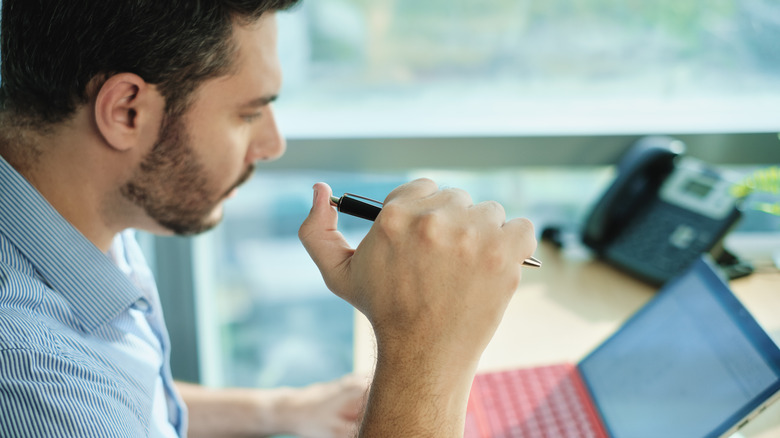Popular Habits That Annoy Everyone Around You
The old adage may tell us "to err is human," but to annoy — and be annoyed — may be just as human. Experts have studied what sorts of things we as people find annoying and why it is we find them so grating, but, unfortunately, there's no magic cure for all of the little, everyday irritations we face. For the most part, we just have to deal, Joe Palca, co-author of Annoying: The Science of What Bugs Us, told NPR.
However, Palca said "cognitive restructuring" can be a helpful technique when you're dealing with an annoying situation. "You can tell yourself that that mosquito is just a part of the life flow of the world and I shouldn't be mad," he explained. "It's just trying to do what it was genetically programmed to do." The same is true when the annoyance is not a flying insect, but a coworker, friend, spouse, or really any other human being for that matter. And the truth is that most of us share the same set of annoying habits, but those habits only irk us when other people do them. So what are they? Here are the most popular infuriating habits most of us do.
Jittery legs
If you've ever sat beside someone who shakes their legs, you likely had a hard time concentrating on anything else. You may not realize it, but there have probably been times when you've done the same exact thing.
In an article for Psychology Today, Susan Krauss Whitbourne, professor emerita of psychological and brain sciences at the University of Massachusetts Amherst, explained that anxiety — something everyone experiences — can be one cause of jittery legs. "Shaking your legs while sitting sends a giant message to everyone around you about your inner feelings of anxiety or irritation or both," she explained. Unfortunately, the expert added, "Your legs are the largest area of your body, so when they move, it's pretty hard for others not to notice."
Although most people can work to stop this habit, seven to ten percent of people in the United States can't just turn off their jittery legs. Those with restless legs syndrome (RLS), a neurological sensory disorder, experience "unpleasant or uncomfortable sensations in the legs and an irresistible urge to move them," according to the National Institute of Neurological Disorders and Stroke.
Eating noisily
Eating can be a pretty wonderful experience, but your appetite may diminish if you find yourself sitting next to someone who is slurping soup, open-mouth chewing, chewing loudly, scraping their utensils across their teeth, or otherwise eating noisily. If you've ever experienced inexplicable anger toward a loud eater, you should know that their eating habits aren't actually to blame. You may be dealing with a condition known as misophonia.
Medical News Today explained, "Misophonia is a disorder where people have abnormally strong and negative reactions to the ordinary sounds humans make, such as chewing or breathing." These reactions "can range from anger and annoyance to panic and the need to flee." But not everyone who finds themselves annoyed at eating sounds is suffering from misophonia. "It is not unusual for people to occasionally be irritated by some everyday sounds," the publication explained. However, a person with misophonia is more likely to experience severe emotional distress as opposed to mild irritation.
Close talking
There's nothing quite so jarring as having a conversation with a close talker. At the outset of the convo, you don't realize things are about to get so weird, but then they do. And then you're stuck doing that awkward dance of trying to regain your personal space while being close-talked into a corner. But if we all hate close talking so much, why do some people do it?
Neuroscientists at the California Institute of Technology (Caltech) discovered a link between the amygdala region of the brain and personal space. The researchers noted that a woman with a damaged amygdala did not recognize others' preference for personal space. But it might not just be about the brain. Cultural differences could also be at play.
Daniel P. Kennedy — a professor of biology, a postdoctoral scholar, and a co-author of the study — explained in an interview with Caltech, saying, "If you're in a culture where standing close to someone is the norm, you'd learn that was acceptable and your personal space would vary accordingly," he said. "Even then, if you violate the accepted cultural distance, it will make people uncomfortable, and the amygdala will drive that feeling."
Word whiskers
"It is difficult for me to watch political speeches," Steven D. Cohen, an instructor at the Harvard Division of Continuing Education and a leading communication expert, admitted. "After all, I know that I am going to hear one alarming word over and over again." That word, he revealed, is "um." There's a good chance you've found yourself similarly annoyed with a person's use of "um" or "like" or "well." These little filler words have been dubbed "word whiskers" — a fitting name for a pet peeve.
Public speaking expert and author of How to Master Public Speaking, Quickly and Easily George Burney revealed on his site that such words are "useless" in public speaking. He clarified, writing, "No, they're worse than that — they're annoying and they detract from your presentation."
In an Inc. article, Deborah Grayson Riegel — a coach, speaker, and author focused on presentation, communication, and leadership skills — revealed that these word whiskers also give "your listeners multiple opportunities to tune out." So, um, like, don't do it, okay?
Uptalking
Using filler words or word whiskers in our speech isn't the only thing that drives people crazy. Hank Davis, professor emeritus of psychology at the University of Guelph in Canada and author of Caveman Logic, highlighted "the uptalk epidemic" in an article for Psychology Today. Uptalk, he explained, is the "ever-growing tendency to end statements with upward inflections to make them sound like questions."
"It's a nasty habit," he wrote. "It is the very opposite of confidence or assertiveness." Eek. Davis revealed that he started noticing the speech pattern in Canada in the early aughts. "Some argued that uptalk had begun as a form of Valley Girl-speak," he added. Although there is no clear origin, he noted the manner of speaking spread from Canada to the United States and across the pond to England.
Of course, Davis isn't the only one infuriated by uptalk. In a survey of 700 managers, executives, and business owners (via the Daily Mail), 71 percent found uptalk to be a "particularly annoying trait" and a whopping 85 percent thought it was a "clear indicator of a person's insecurity or emotional weakness." Sorry?
Spitting
Ever stop and wonder why so many guys seem to spit pretty much as soon as they step outside? No? Well, we did. And, apparently, it's not just to gross us out. Susan Maples, dentist and author of Blabber Mouth: 77 Secrets Only Your Mouth Can Tell You to Live a Healthier, Happier, Sexier Life, explained the phenomenon when speaking to Women's Health. "It's purely cultural: Some guys spit because they grew up thinking it's cool and didn't get chastised the way girls might for spitting," she explained. "Others develop the habit from spitting out chewing tobacco."
As it turns out, though, there may also be a biological reason why men are more likely than women to spit on an unsuspecting sidewalk. One 2006 study found that healthy men had larger salivary glands than healthy women. As such, they also experienced a higher "flow rate" of saliva. True story.
Chewing gum
You may love chewing a piece of Big Red or Dubble Bubble, but what about listening to someone else smack their chewing gum or pop bubbles? It's possible you just find the sound a little irritating, but those with misophonia may feel like this is some kind of torture. Mouth sounds are especially triggering to those with the condition and the sounds from chewing gum are certainly not excluded.
"Chewing is almost universal. Gum chewing is almost universal," Jaelline Jaffe, a Los Angeles-based psychotherapist who specializes in misophonia, told NPR. For a person with misophonia, gum-chewing sounds seem to make "the survival part of the brain" believe it's "being attacked or it's in danger."
In addition to misophonia, other people also experience chiclephobia, or the fear of chewing gum. Those with this phobia may be terrified of the stuff and find it completely gross. While chiclephobia is not a common fear, some think Oprah Winfrey may be chicleophobic because of her stance on gum. "I hate chewing gum," she once told People. "It makes me sick just to think about it. When people chew loudly or smack it and pull it out of their mouth, that's the worst."
Nail-biting
As much as you may not want to believe this: millions of Americans bite their nails. "Everybody picks and bites to a degree," Fred Penzel, a psychologist who works with patients with body-focused repetitive disorders, told Vox. This is true even though science has told us how gross — and bad for us — it is. So, why, despite all of the evidence, do a lot of us still engage in this totally frustrating and destructive habit?
"When [people are] understimulated, the behaviors [provide] stimulation, and when they're overstimulated, it actually helps calm them down," he explained. Much like nicotine, experts believe there's a biphasic effect to nail-biting, which means it can work as a stimulant or a depressant depending on the circumstance. It is possible to curb this habit, though. Penzel explained, "We try to identify all the triggers and control them in various ways — either by blocking them or by finding substitutes."
Knuckle-cracking
"Knuckle cracking is a common behavior enjoyed by many," Robert Shmerling, an associate physician and clinical chief of rheumatology at Beth Israel Deaconess Medical Center and an associate professor of medicine at Harvard Medical School, explained in an article for Harvard Health Publishing. He continued, writing, "For some, it's simply an annoying thing that other people do."
If you're a knuckle-cracker, your mom may have warned you that if you didn't stop, you'd end up with arthritis. However, we now know that's not true. Harvard Health Publishing revealed, "Cracking your knuckles may aggravate the people around you, but it probably won't raise your risk for arthritis." Take that, Mom!
But what is happening when you crack your knuckles? The science behind it may make even those of us who have this habit squeamish. Essentially, cracking your knuckles increases the space between your joints. In turn, gas bubbles in the joint fluid burst. "It's a bit like blowing up a balloon and then stretching the walls of the balloon outward until it pops," Shmerling revealed. It sounds gross — and is gross, to some people — but it is "probably harmless."
Pen-clicking
It seems every meeting has its designated pen-clicker. While trying to listen to the speaker, you may find yourself scanning the room to figure out who is clicking their pen and why. If you've ever come close to hulking out in the middle of the workday over this incessant, irritating noise, we hear you. And if you've ever envisioned throwing all of the pens out of your office window, well, there's a reason for that.
Although many people with misophonia are triggered by mouth noises, pen-clicking can be just as infuriating. Medical News Today reported that "clicking a pen can make them want to scream or hit out." Unfortunately, there is no treatment for this condition — though one could argue that people should, you know, just stop constantly clicking their pens.
Likewise, it's also important to remember that someone with misophonia can't simply forget about the sound. In fact, the publication said telling someone to ignore the annoying noise is akin to "telling a person with depression to 'snap out of it.'" Not only is it insensitive, but it also won't work. After all, both misophonia and depression are conditions of the brain.
Interrupting conversations
It's hard to have a conversation with someone who constantly interrupts you. Although we may all be guilty of doing this at times, some have made it a habit. And they may not even have realized this is the case. One Reddit user posed the question (via The Telegraph): "What's a bad habit you never knew you did until someone pointed it out to you?" Of the thousands of responses, "interrupting people" was a big one. One user admitted, "I always interrupt people and ever since it was pointed out to me I've been shocked by how often I've had to stop myself butting in."
Rhonda Scharf, a professional speaker, admitted in an article for HuffPost that she, too, possesses the "very bad" and "incredibly annoying habit" of cutting off other people while they're talking. "I don't intend to be rude," she opined. "I just seem to think that I know where the other person is going and that I can get there faster." Yet she believes this habit can — and should — be broken with a little awareness and effort.
Borrowing items
How often do you borrow things without returning them? While we've all probably forgotten about a library book or two, borrowing something from a friend and then failing to return it is a habit that most definitely causes frustration. "It's one thing to borrow a pen and forget to return it once, but people notice when they don't get even small things back," life coach Desiree Wiercyski revealed in an interview with Bustle. Even if your friend never brings up the time you borrowed her little black dress and never brought it back, there's a good chance she remembers — and that memory isn't a fond one.
"I've coached clients who have been on the end of having let someone borrow something multiple times and not getting it back, and they often feel resentful and definitely annoyed," Wiercyski revealed. Instead of being lackadaisical with returns, make it a priority to make good on your word. "That way people feel positive about the interaction and it builds an additional level of trust," the life coach added.
Other people's phone calls
Regardless of how you feel about talking on the phone, we can all agree that hearing someone else's phone conversation is beyond annoying. But why is that so irritating?
In an excerpt for the book Annoying: The Science of What Bugs Us published by NPR, Lauren Emberson, a psychology graduate student who studied the subject, revealed, "I think the reason why is that we can't tune it out." She continued, saying, "We find it more rude than someone having a conversation around us because our attention is drawn in and that makes us irritated that we can't be doing the other things or thinking about the other things that we want to."
Emberson dubbed this phenomenon "halfalogue" and found that no matter how hard we try to ignore these quite literal one-sided conversations, we can't. According to Emberson, our minds are hardwired to try to predict what's coming next, but that is really difficult when you're only hearing one half of a conversation. Still, the brain will continue to try to process the information it's been given — and annoy us in the process. Thanks, brain.
Twirling hair
After Refinery29 writer Lauren Bravo's colleague revealed how much she disliked the habit of hair-touching, it occurred to Bravo that she herself was someone who often twirled or played with her hair. Hair-touching can be annoying to others, but, like Bravo, you may not even realize it's one of your annoying habits.
"We often play with our hair unconsciously. It can be when we are bored, deep in thought, nervous or stressed — hence the term 'tearing out your hair,'" Anabel Kingsley, a trichologist at Philip Kingsley, told the publication. "Hair pulling may be used as a coping mechanism, and as a way to initially alleviate feelings of anxiety." And, unfortunately, any time you engage in this habit, you're sending a signal that you're experiencing "very high discomfort," according to behavioral expert Vanessa Van Edwards. "Even if they're not anxious," she said, "it still comes across as low self-esteem."














